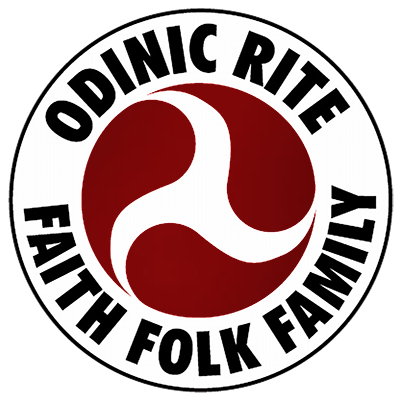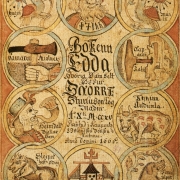From a Word to a Word
By Volksieg AOR
The Stranger within my gate,
He may be true or kind,
But he does not talk my talk–
I cannot feel his mind.
I see the face and the eyes and the mouth,
But not the soul behind.
– “The Stranger” by Rudyard Kipling
Language is one of the greatest tools and gifts mankind has ever wielded. Imagine a world without language? If one tries, even for a second, one has usually failed mainly because, even in the process of trying to imagine this alternate reality, one has probably already thought “Okay, so, for a start, everyone would be silent….”… “Okay” – That is a word. “So”,”For”,”A”, “Start”…. all words and, therefore, obviously, all a part of language.
Already it should start to become apparent that without the gift of language, even the process of thought which is something we, as sentient beings, take for granted is impossible. The rich inner world we each inhabit and explore cannot even take shape without the tools which language has provided.
Now the purpose of this piece is to, not only demonstrate that without the gift of language the external world which we take for granted just as much, if not more so, than our own internal realities would become meaningless in any quantifiable sense (or at least beyond an instinctual Problem/Reaction level.), but also to explain how this fits in with the concept of ethnic, organic religion and the folkish position.
Buckle your seatbelts, comrades, for this is going to be a rather peculiar ride.
Of course I am not suggesting that “Objective Reality” or the material realm is a pure construct of the human, let alone the individual, mind but that any meaningful interpretation of this “reality” would be impossible and we would not only be incapable of “seeing the wood for the trees”… we wouldn’t even know what the trees were, what the wood was or even be able to consider that we could or could not see them in the first place…..whatever “they” are. We certainly couldn’t tell anyone about it!
From this we can ascertain that language is the very building blocks of sentience, thought, identity and forms our own specific realities both internally and externally.
When language first developed for our people, as in fact for all peoples, it started with the simple naming of things, nouns, such as “tree”, “cave”, “river”, “Wolf” etc. From this our ancestors could start to differentiate and categorize whatever raw data was presented to their senses. This, of course, led on to further linguistic innovations, verbs, such as “climb”, for our theoretical early man may wish to, not only “climb” this “tree”, but he may also wish to share this newly found technique with his neighbour. He would also wish to “avoid the Wolf”, “Swim the river” etc. We can see this demonstrated even in our own children as they learn to speak: first comes the naming of things then slowly, as their vocabulary grows, they learn about the different relationships, how these objects can be manipulated to their benefit or woe and the child slowly, through the tools of language, develops thought processes and, eventually, a fully formed personality and, hopefully, individuation as they mature to adulthood.
So how does this tie in with the folkish position, one may ask?
Through the processes of evolution and natural selection, it can be safely said that all the physical differences demonstrated by the many races of man are due to adaptation to their environments be that skin colour, shape of nose, shape of eyes, and so on, to ensure any particular tribe’s survival. These facts are beyond dispute. Language, when considered as a tool which enables man to not only understand but also to convey knowledge to his brothers and sisters, is a vital survival tool and is also, by its very necessity, connected to the land from which a race springs. What use a word for the creature we know as the “Wolf” when there are no wolves to be encountered, much less warned of? What use a name for the “Birch tree” when there are no Birches to be described let alone climbed? The list could go on infinitely.
When one considers just how important the environment becomes in the formulation of a language, as well as the development of the more obvious physical distinctions which separate mankind, it soon becomes apparent, through the development of these distinct, territorially bound, languages, and thus vital thought processes, that two tribes from vastly different environmental origins, with the many different challenges such tribes would have faced in the early stages of their forming and thus the different internal realities which serve to compliment their distinct external realities…. they must not, logically, cannot and do not think or feel the same way.
An amusing example of this phenomenon is the “I Ching”, or Book of Changes, an ancient Chinese divination tool which became incredibly popular, like many eastern spiritual practices, during the 1960s. I happen to have a copy of this particular divination tool amongst my varied collection of books and bric-a-brac and shall now conduct an experiment to hopefully demonstrate what I have been writing about. I do not possess the coins or stalks necessary to perform the various tasks required of me but, as these objects essentially provide nothing more than a random generator to help create what is known as a “Hexagram”, I shall adopt a far more primitive technique and randomly select a page once I have concentrated upon the question which vexes me so.
The question for this experiment is: “Will people enjoy my contributions to OR Media?”
Here goes…………
The answer I have been provided with is:
38
THE KHWEI HEXAGRAM
Sun of Water
KHWEI: All’s disunion, mother of distress;
But in small matters there may be success.
Lost steeds return; bad men may yet take thy way;
Thy lord may chance to meet thee – in the byway.
Baffled and punished? Bide time’s amnesty.
Alone and disunion? Friends on highway
Joined with thy minister thy course is free.
Pigs? Ghosts? Foes? Nay! Go forward on the skyway.
Well. I’m glad that’s cleared up then!
Now far be it for me to ridicule an ancient wisdom from a foreign shore! This demonstration is certainly not intended to mock this Chinese practice though it has demonstrated something else.
There is a very good reason why this “Hexagram No. 38” is utterly meaningless to me. The languages of the Orient are very different from the languages of the Northern Indo-European people inasmuch as, although our languages are wonderfully descriptive and serve their purpose admirably, our words are constructed from letters whereas the languages of the Orient are composed of symbols known as Pictograms.
Each character, or Pictogram, is, of itself, a word. Each symbol represents the very essence which said symbol is attempting to convey.
From the usage and development of a Pictogram based language, the mental topography of the Chinese man is vastly different from that of the European. He sees and thinks on a completely different level so, upon casting his yarrow stalks, he is visualizing these “lost steeds” and these aforementioned “friends on the highway” and, from the mechanics of this alien mindset he can take much meaning and, perhaps, much wisdom. To the Northern Indo-European man, it is fairly meaningless because we do not possess the internal reality necessary to even begin to understand what this system is trying to convey.
One is reminded somewhat of the apocryphal Eskimos with their “One Thousand names for Snow” and the story of how, when threatened by Christian Missionaries with “Hellfire and Brimstone”, replied “Great! How do we get there?” or stories of inhabitants of Rain Forests who have multiple names for shades of green that we, as outsiders, are totally incapable of even perceiving. There are many other similar examples such as one theory that the ancient Greeks, with their description of “Bronze skies” had not, at the time, developed the ability to perceive the colour blue…. Whether this is true or not, I know neither way, but it is certainly an interesting theory.
So, in conclusion:
Environment creates language and race.
Environment, language and race, combined, create racially specific thought processes.
Racially specific thought processes create racially specific “myth needs”.
Racially specific “myth needs” create…….
Organic Ethnic Religions such as Odinism. – Something only a Northern Indo-European could ever hope to understand, and fully assimilate, on a spiritual level.
I have written this piece to, perhaps, provide food for thought and maybe give a little push towards further study for the individual reader whose interest may be sparked by this short essay. I would ask, though, that when considering these examples and ideas, one keeps in mind the sacrifice of Odin on the branches of Yggdrasil and his discovery of the runes and the power that they possess. Other topics to explore would be that most dreaded phenomenon known as “Political Correctness”, the Orwellian term “Newspeak” and the techniques of Neurolinguistic programming.
If you, dear reader, are anything like me you may find yourself wondering, when considering the magical power of words, and their intrinsic connection to the nature of perceived reality, who exactly is trying to reshape, twist and control our own realities and why?
And may we speak our own North tongue until the end of days!
FFF/HTR




